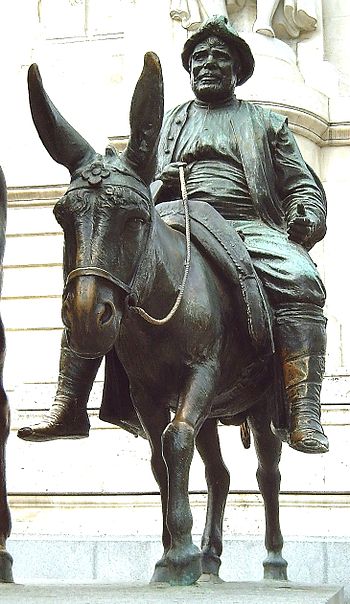Sancho Panza as Survivor and Lovable Fool
|
|

Caption: Statue of Sancho Panza in Madrid by
Lorenzo Coullaut Valera, 1930.
"I tell you, when it comes to asking stupid questions and giving crazy answers, I don't need to go looking for help from my neighbors." - Sancho Panza.
My students – there are 20 of them in the Democratic Workplace class at the University of Latvia – this week are reading Robert E. Kelley’s “Followership”. I’ll juxtaposition my talk about Kelley’s follower taxonomy with Casciaro & Lobo’s perspective about our colleagues at work, the Competent Jerks and Lovable Stars and Fools.
I want the students to enlarge - beyond a rigid taxonomy - their understanding of the people they work with and how they (the students) interact with their colleagues. For example, the lovable fool (Kelley’s "survivor"/ follower with a sense of humor) is there to lubricate the social interchanges, to harmonize the group as it takes on tasks. He or she provides the good will, the bonhomie to get us past the hard parts and to begin to feel better about each other; at least to move us past the negatives of group formation to something more positive.
I’m reminded of the illustrious adventures of the Knight of the Mournful Countenance, Don Quixote, and his erstwhile Squire, Sancho Panza.
It is the mix between the beleaguered Don Quixote and the rascally Sancho - the incompetent leader and the lovable fool -that gets them as far as they get – which is not very far, but their journey is not lacking for adventures and meaning, real and imagined.
Sancho Panza is, for me, the Lovable Fool described by Casciaro and Lobo. He is hardly their “lovable star” but he is not their bifurcated Jerk. For Cervantes, Sancho continues the Plautine tradition of the Aesopic fool, the wily and rascally servant, the lovable fool. Has there ever been a more lovable fool than Sancho?
But, just how foolish is this lovable fool? When Sancho gets his wish to rule an island – as a reward for serving the Knight Errant – he governs with a Solomon-like wisdom. Not much of a fool after all.
The two adventurers share a remarkable honesty. Don Quixote gets angry at Sancho’s antics, his cupidity, his laziness but it is always tempered with fondness and respect. Nor is Sancho afraid to give equal measure to what he gets from his master, as this droll exchange suggests when Don Quixote remarks on Sancho’s becoming less of a dolt:
"Ay," said Sancho; "it must be that some of your worship's shrewdness sticks to me; land that, of itself, is barren and dry, will come to yield good fruit if you fertilize it and till it; what I mean is that your worship's conversation has been the manure that has fallen on the barren soil of my dry wit, and the time I have been in your service and society has been the tilling; and with the help of this I hope to yield fruit in abundance that will not fall away or slide from those paths of good breeding that your worship has made in my parched understanding."
That Don Quixote laughs at this statement suggests his ability to rise above what could be insulting language and to, instead, appreciate the joke. Nor is this the only instance. As they make their way across arid Andalusia, their relationship matures, strengthens. Kind of like what I would like to see happen in the class as the students get to know each other. I’d like for them to expand their horizons beyond those colleagues with whom they are already comfortable. I’d like to see them reach out to a classmate that’s still a bit of a mystery, to get past stereotypes and first impressions.
Copyright 2014 John Lubans
 John Lubans - portrait by WSJ
John Lubans - portrait by WSJ